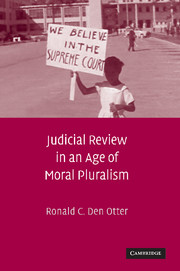Book contents
- Frontmatter
- Contents
- Acknowledgments
- Introduction
- 1 Public Justification and Constitutional Theory
- 2 Freedom and Equality in Constitutional History
- 3 The Challenge of Public Justification
- 4 Competing Conceptions of Public Reason
- 5 Constitutional Public Reason
- 6 The Limits of Public Justification
- 7 Standard Objections to Public Reason
- 8 Easier Cases
- 9 Harder Cases
- 10 The Case for Judicial Review
- Conclusion
- References
- Index
- References
1 - Public Justification and Constitutional Theory
Published online by Cambridge University Press: 17 December 2010
- Frontmatter
- Contents
- Acknowledgments
- Introduction
- 1 Public Justification and Constitutional Theory
- 2 Freedom and Equality in Constitutional History
- 3 The Challenge of Public Justification
- 4 Competing Conceptions of Public Reason
- 5 Constitutional Public Reason
- 6 The Limits of Public Justification
- 7 Standard Objections to Public Reason
- 8 Easier Cases
- 9 Harder Cases
- 10 The Case for Judicial Review
- Conclusion
- References
- Index
- References
Summary
The purpose of this chapter is to spell out why an ideal of public justification is essential to both constitutional theory and practice. I begin with some thoughts on why Americans have mixed feelings about judicial review and how their ambivalence reflects understandable concerns about the abuse of judicial power in a democracy. After summarizing the shortcomings of textualism, I describe the appeal of originalist approaches to constitutional adjudication. Some conservatives have used a crude form of originalism to mislead the public into thinking that judges who do not stick to the plain or original meaning of the text must be legislating from the bench. At present, perhaps because of what happened to Robert Bork in 1987, no one expects a nominee to out himself as an originalist. At the same time, a candidate's denial that judges make value judgments in important constitutional cases has become a code hinting at the nominee's originalist sympathies. In his recent confirmation hearing, John Roberts testified that judging is like calling balls and strikes.
That metaphor suggests that a judge, who does his or her job properly, merely follows legal rules in deciding constitutional cases; a judge who makes a mistake either has made a factual error or has manipulated the law, like an umpire who has tampered with the strike zone. As I shall show, this characterization of judging is inaccurate.
- Type
- Chapter
- Information
- Judicial Review in an Age of Moral Pluralism , pp. 22 - 51Publisher: Cambridge University PressPrint publication year: 2009



